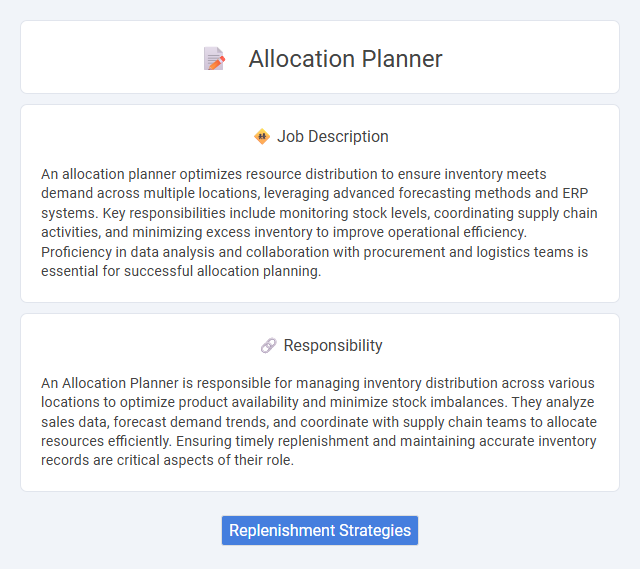
An allocation planner optimizes resource distribution to ensure inventory meets demand across multiple locations, leveraging advanced forecasting methods and ERP systems. Key responsibilities include monitoring stock levels, coordinating supply chain activities, and minimizing excess inventory to improve operational efficiency. Proficiency in data analysis and collaboration with procurement and logistics teams is essential for successful allocation planning.
Candidates with strong organizational skills and the ability to analyze data are likely to succeed as allocation planners, as the role demands precise resource distribution and forecasting. Those who thrive in structured environments and can manage multiple priorities may find this job suitable due to its emphasis on planning and logistics coordination. Individuals who struggle with adapting to fast-paced changes or have difficulty in quantitative analysis might face challenges performing effectively in this position.
Qualification
Allocation planner positions typically require a bachelor's degree in supply chain management, logistics, business administration, or a related field. Proficiency in inventory management software, strong analytical skills, and experience with demand forecasting are essential to optimize product distribution and stock levels. Candidates with exceptional organizational abilities, attention to detail, and effective communication skills excel in coordinating supply chain activities and ensuring timely allocation of resources.
Responsibility
An Allocation Planner is responsible for managing inventory distribution across various locations to optimize product availability and minimize stock imbalances. They analyze sales data, forecast demand trends, and coordinate with supply chain teams to allocate resources efficiently. Ensuring timely replenishment and maintaining accurate inventory records are critical aspects of their role.
Benefit
The role of an allocation planner likely brings significant benefits such as improved inventory management and optimized resource distribution, which can enhance overall operational efficiency. This position probably contributes to cost reduction by minimizing overstock and stockouts, leading to better financial outcomes for the company. Furthermore, successful allocation planning may increase customer satisfaction through timely product availability and more accurate demand forecasting.
Challenge
An allocation planner faces the challenge of predicting demand fluctuations accurately while balancing inventory levels to minimize costs and avoid stockouts. Managing complex supply chains with multiple variables such as lead times, production capacity, and market trends likely requires strong analytical skills and adaptability. The role probably demands continuous problem-solving to optimize resource distribution under tight deadlines and shifting priorities.
Career Advancement
An Allocation Planner plays a crucial role in optimizing inventory distribution to maximize sales and minimize stockouts across multiple locations. Mastery of demand forecasting, supply chain analytics, and advanced inventory management systems can accelerate career progression toward senior planning or supply chain management roles. Professionals who continuously enhance their skills in data-driven decision making and cross-functional collaboration significantly increase their potential for leadership positions within the logistics and retail sectors.
Key Terms
Replenishment Strategies
Allocation planners optimize inventory distribution by developing effective replenishment strategies that balance stock levels across multiple locations. They analyze demand patterns, lead times, and sales data to forecast inventory needs, ensuring product availability while minimizing excess stock. Advanced replenishment methods such as just-in-time (JIT) and automated reorder points enhance supply chain efficiency and reduce carrying costs.
 kuljobs.com
kuljobs.com